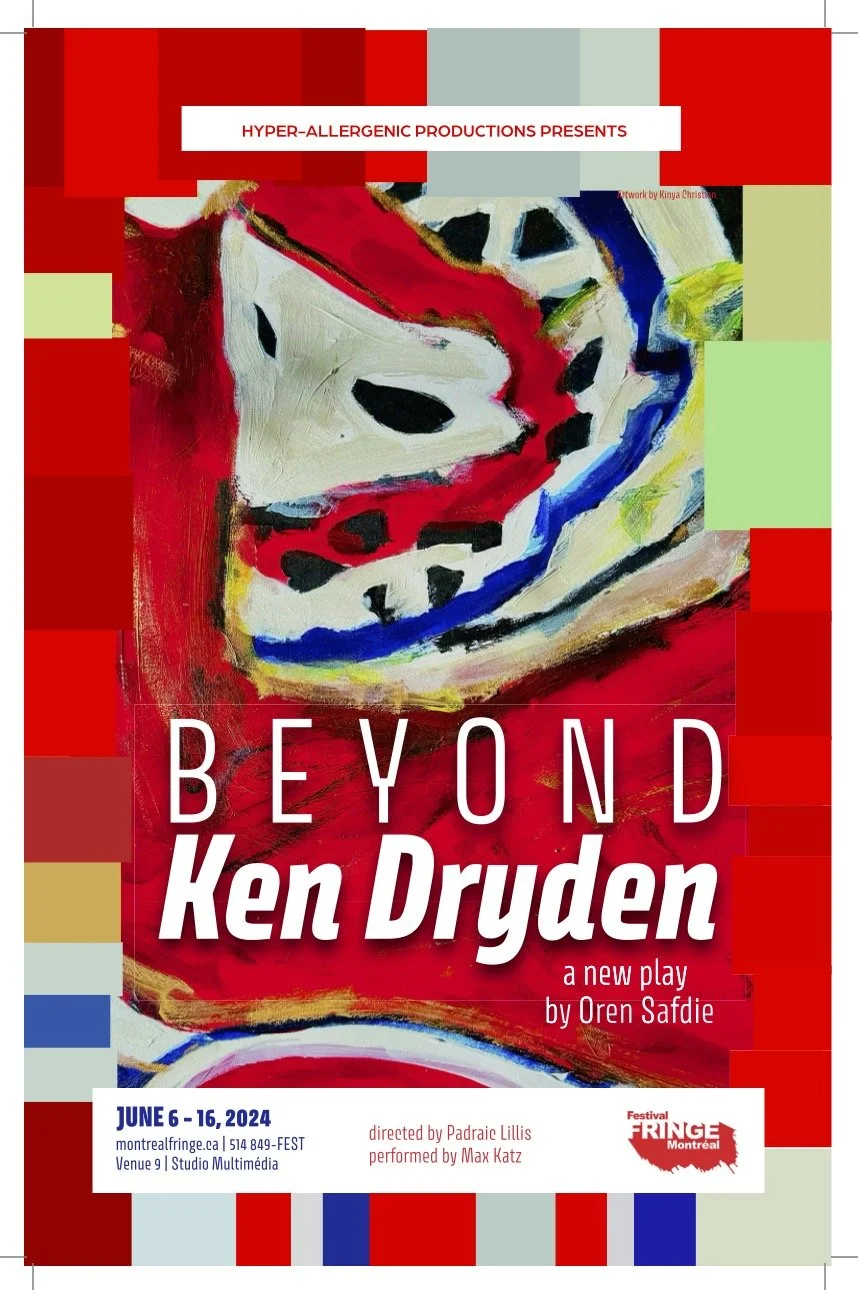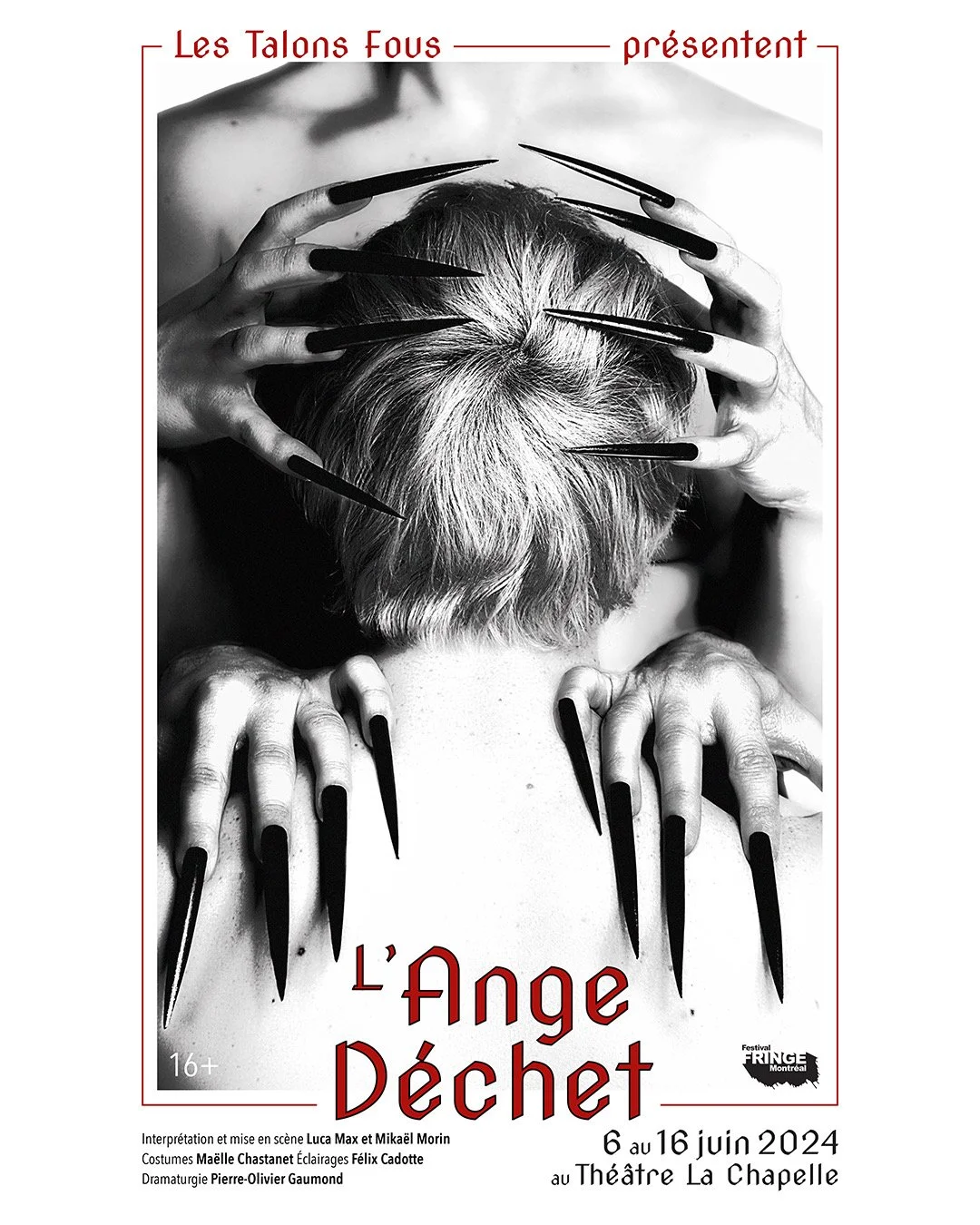Andrew’s Reviews
Jimmy Hogg: The Potato King
Montreal’s erratic weather never disappoints, and Friday night was particularly manic. The rain poured, then stopped, then poured again, then stopped… I was particularly damp as I arrived at O PATROS VYS for Jimmy Hogg’s 10:15PM performance of The Potato King. Now, don’t get me wrong, I enjoy American (Canadian) comedy. Observational humor and witty one-liners are always good for a laugh, but I’m particularly fond of the dry wit, the clever sarcasm, and the awkwardness of comics from the UK. As such, I jumped on the opportunity to review Jimmy Hogg’s production when presented with the opportunity. Described as… well… nothing, I walked up the stairs to O PATROS VYS with only the knowledge that the show contained potatoes and some mime. I quite like potatoes, but I’m not that fond of miming. But Jimmy isn’t French, so I’m sure it’ll be amusing. (Spoiler: it was.)
When it comes to FringeMTL, it’s difficult to say that any venue is perfect, but the setting for The Potato King was as close as you could get. The room isn’t small, by any means, with cabaret-style seating, and longer bar benches and higher seating toward the back, closer to the bar and soundbooth. The lighting was simple, a soft wash across the stage, and the set was even simpler: a single chair, rarely used, and a mug (which I hope was filled with bourbon) on top of a speaker, stage left. This was all that was needed, because everything else on the stage in this 60 minute performance was generated by the thoughts and words of Jimmy, and I can guarantee that everyone could see the set pieces and characters as though they were genuinely present.
Jimmy begins the storytelling with an anecdote about his mother losing her virginity, setting the tone of the evening with concrete certainty: this is going to be a wild ride. “It’s a love story” he tells us, as he pushes through to the protein of the piece. Jimmy Hogg’s energy is seemingly boundless, and while that Friday night the room may have been half-filled, there was no space that he didn’t occupy. Simultaneously charming and chaotic, Jimmy’s movement around the stage is not just an outlet for his energy, but him creating, building the set pieces for the stories he weaves about love, loss, potatoes, and risotto. The latter being anchor points in stories about ex-girlfriends, ones who have no taste, ones who have no sense of time.
Jimmy Hogg’s passion for food had me in stitches from the earliest moments of the show. From knife skills to meat selection to wine pairings, he expressed his love for the finer aspects of cooking. Watching him work up a sweat while lecturing the audience on the proper way to cook risotto had me cry-laughing so hard I couldn’t take notes. Some of Jimmy’s references are universal, and some are niche, and that’s okay he reminds the audience as I’m the sole person to laugh at a joke about Brecht. “Try not to be so selfish,” he tells the women at the front, “not everything is for you.”
Sixty minutes is a long time to be alone on stage, and the text of the piece was extensive. Yet Jimmy managed, on his opening night, to execute flawlessly (at least, from where I sat). I could write much more about this production. I’m grateful to have seen it. Jimmy Hogg is an absolute professional, and his command of the stage was on display in full force. He is a man panicked in the face of the absurdities of our daily lives, and yet I left with a renewed sense that everything will be okay, especially if we can laugh.
La Germaine et le Vieux Criss
For my third visit to the Cité-des-Hospitalières, I was grateful to once again return to the Chapel. Previously having attended a dance performance here, I was excited to catch something spoken, La Germaine et Le Vieux Criss. The chapel is a beautiful, if not slightly cavernous, performance space, and I was curious how a one-woman production would handle the size. The rain had stopped long enough for me to walk over to the venue early enough, and when I arrived I had plenty of pews to choose from. Predictably sitting further back, into the darkness, I opened my program to refresh my memory. The play is written, directed, and starring Alexia Côté, and that’s an enormous undertaking. The story follows Béatrice, who works at a CHSLD, and her visits to a psychologist mandated by her employer. At once the piece examines some of the darker aspects of our healthcare system, the decisions we make (and the impact they have), and the fragility of life.
The stage, the altar at the front of the Chapel, was comfortably bare. At the centre were two wooden chairs, side by side. Flanking those were two podiums, the one on stage left holding a golden box (unused through the production, which I found curious) and the one on stage right holding a thin microphone. A table with the show’s tech sat in the liminal space between the audience and stage. One would think that inside an enormous chapel with vaulted ceilings that this stage design would be lost, and yet my focus was easily pulled to the centre of the stage, centre of the story, by the incredibly talented Alexia Côté. Credited as a multi-disciplinary artist, Alexia managed to fill the stage, refusing to let you look anywhere else. This was helped by the fact that we the audience play the role of the psychologist, with our main character often sitting centre stage addressing us directly.
I know I’ve already said it in this review, but Alexia Côté is a powerful performer. My understanding of French is intermediate, it’s not perfect, but I didn’t miss a thing. Expecting something more dramatic, I was pleasantly surprised to experience as many laughs as I did. Alexia doesn’t allow the audience to sit in sorrow, but rather laugh through it, if possible, whenever possible. While her voice was infrequently lost to the Chapel, as many others in this venue have experienced, Alexia didn’t need to rely solely on her words, with her staging making it abundantly clear what the character was feeling and experiencing in each moment. The sessions with the psychologist, broken up by brief music interludes, allow us to track Béatrice’s life, making us very present with her during a heartbreaking climax.
La Germaine et Le Vieux Criss is nothing like what I expected, and I mean that in the best way. My heart was filled with joy, with sorrow, with understanding. Due to Alexia Côté’s writing and performance, I feel like I had the blessing of getting to know another human being, to make a connection, one I wouldn’t have otherwise experienced. This is a French production, yes, and while Alexia may have a habit of speaking quickly, as many French Canadians do, I can say with certainty that you don’t have to understand every word to witness, and be moved, by this moving piece of theatre.
Beyond Ken Dryden
My father was a pro hockey coach. Growing up with personal relationships with many players that my friends idolized was strange, I’ve never been able to relate to that sort of admiration. So, I’ll make this admission: I wasn’t entirely thrilled to see this production. But here I am, writing to tell you that I was pleasantly surprised. In fact, I came away with a much greater understanding of how and why we behave in this strange way, idolizing pro athletes.
Walking into the Conservatoire de musique et d'art dramatique du Québec for a Sunday matinee, I was impressed by the size of the audience, which was nearly sold out. I took a place near the front of the stage, which was sparsely set: a metal folding chair at centre stage, a hockey stick, and two tennis balls. Written by Oren Safdie, and performed by the wickedly talented Max Katz, Beyond Ken Dryden is a nostalgic journey through the early 70’s in Montreal, with 1971 being a very important year in the author’s life: this is the year that Ken Dryden began to play for the Montreal Canadiens.
While Max Katz is certainly not 7 years old, he is filled with child-like wonder, and an infectious frenetic energy. Safdie uses the backdrop of his growing love of hockey, and his hometown team, to guide us through troubling aspects of his young life between the ages of 7 and 14, ultimately leading to the drawn-out divorce of his parents. Katz bounds around the stage relating hilarious stories of Safdie’s relationships with his mother and father, his grandfather, and his sister, while also documenting the loss of innocence (and attempts to understand this) through crushing tales, like discovering his father’s affair at a very young age.
While the set, and the lighting design, are simple, sound cues are used regularly. We hear roaring crowds of Canadiens fans, play-by-play commentary on both the radio and television, the latter of which wasn’t actually there, but sat down stage centre when necessary. The text of Beyond Ken Dryden is expansive, and Katz rarely stops speaking. Yet, he never stumbles, never falters (at least not noticeably), leaving me in awe.
This production is about much more than hockey, and about much more than family. This is a story about the shared human experiences of sadness, frustration, confusion, anger, and how and where we find escape, where we find happiness. As I mentioned, Sadie helped me understand the motivation behind a person’s admiration for a sports team, or a particular athlete, and for that I’m grateful. The fact that I reached that understanding through a well-written and expertly performed play? That’s an overtime goal.
L'Ange Déchet
First, I want to make clear that I do not believe this show was for me. In that, I mean that I am not the target audience. I am a Queer artist, yes, but Queer art is not a monolith, rather an incredibly diverse patchwork. For myself, I yearn to experience Queer art that isn’t hyper-focused on sex. In my own work, the sexuality of characters is incidental (and likely fluid), with the story being told given the majority of focus. But, that’s myself, my work, and as I mentioned, not everything is for everyone.
I kept that thought in the front of my mind as I approached La Chappelle on Wednesday evening to catch L'Ange Déchet, from Les Talons Fou. This production is a prequel to their work in last year’s Fringe festival, Le Fruit Défendu. Described as circus and pole-theatre, the piece promises to deliver a story about Samael, a fallen angel, and the influence of Lilith, upon meeting her in Hell.
The theatre was nearly full, and I tucked myself away at the top of the crowd. The buzz of Fringe was in full-swing, as conversations revolved around what have you seen?, and what are you going to see?, with the occasional I heard that was so good. As the lights dimmed, the anxious crowd began to applaud, before the show began. While I may not have been the target audience, they certainly reached theirs, as the theatre was filled with positive and supportive energy that was incredibly infectious.
The movement, the dancing, the pole work, all were flawless. The skill and talent of both Luca Max (Lilith) and Mikaël Morin (Samael) were on full display. As the duo not only starred in the production, but directed and wrote it, it’s clear that they’re both very aware of their abilities and limitations, and they presented to us their absolute strengths on stage. While there was less circus than I’d expected (although, really, what was I expecting?), the physicality of both performers contributed to a visually stunning piece. Particular appreciation to Max, as Lilith, who spent the first part of the production as a quadruped. Morin was crackling with energy as Samael, using his body to tell the story of an insecure, anxious, scared character coming into their own, finding their confidence, finding their voice.
The beauty of FringeMTL is that a production may have the opportunity to run in a venue that may not have otherwise been available to them. La Chappelle is no exception. The stage is enormous, the tech is excellent. (The seats leave something to be desired.) Predictably, red lighting was used throughout the production, as the setting was Hell. Accompanying that, though, was a beautiful soundscape throughout the piece, giving the sense that the location was not only terrifying, but expansive. The narration, while integral, could have benefitted from a more articulate and commanding voice. But that can be quickly overlooked once Donna Summer begins to play. (Twice.)
Ultimately, the piece is great fun. It charges full speed from start to finish, with the confidence of a production that’s run for years. I attribute that to the work done by Max and Morin, who clearly have an inspiring collaborative relationship. As a bit of a religious scholar myself, I was anticipating something more Biblically-focused, or accurate, but the production’s relationship with the source material is loose, at best. However, L'Ange Déchet delivered on its promise of entertainment. Between the pole dancing, the real dancing, the physicality of the performers, and the comedy, it’s hard to imagine anyone not being thoroughly entertained, whether you’re the target audience, or not.






